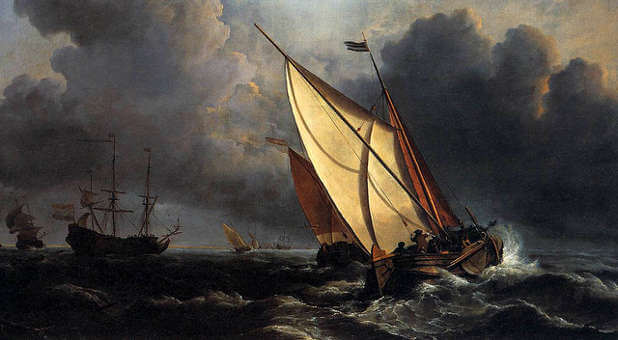The late Peter Marshall once opened a session of the United States Senate with this prayer: “Our Father, when we long for life without trials and work, without difficulties, remind us that oaks grow strong in contrary winds and diamonds are made under pressure. With stout hearts may we see in every calamity an opportunity and not give way to the pessimist that sees in every opportunity a calamity.”
Yes, oaks and diamonds—as well as God’s purposes for your life—take time to form. David, however, in Psalms 69 and 70 cries out for an immediate extraction from his difficulty. Like him, are you so hard pressed you beg the Lord, “Please do something right now”? You’re not interested in becoming a mighty oak or a beautiful diamond—just surviving would be fine for the present.
Differing Moods During Difficulty
Both Psalms 69 and 70 are pleas for help from God, but Psalm 69 is far more intense: waters up to the neck, sinking in miry depths and a voice worn out from calling for help.
“Make haste, O God, to deliver me! Make haste to help me, O LORD” (Psalm 70:1).
Both psalms, however, show us that the important thing is to continue calling out. In his own deep need and hour of danger, David kept coming to God. Likewise, you must not give up in your trial. Even if a successful outcome seems impossible, you must continue your quest for God’s intervention. It is unmistakable evidence of your desire to go on living. Dead fish don’t struggle. Calling out to the Lord means you want help, that you consider life worthwhile, and that you also recognize you have no power to save yourself.
God’s Slowness
God often seems slow. You may not have realized this until now. In the past you may have heard others talk about God’s “delays”—but you never felt them personally. Now you do. God is very slow. Why else would you, like David, cry out, “Make haste, O God, to deliver me! Make haste to help me, O LORD” (Psalm 70:1)?
Why this lackadaisical pace in God? Is it because victories gained after hard-fought battles are enjoyed more? Or do you learn the lesson better? Could it be that you need the external wait in order for your internal life to be remodeled? Is it possible that God is interweaving plans for other people’s lives with yours—and you have to wait for them in order for the more perfect blending of the intersection of His plan for them and you?
At the moment, you ask those questions but have no answers. During the hour of trial, most of us do not know the cause for God’s delay in extricating us.
But you must avoid false thinking regarding God’s slowness. It is not because He is powerless, nor because He does not care. Neither is He sleeping, indifferent or unconcerned. If He delays, it’s not because He doesn’t love you or lacks the power to rescue.
Here is where faith enters—when you trust Him in your storms. God is too wise to be mistaken and too loving to be unkind.
The Human Solution
When in need, your focus shifts back and forth from God to yourself to your problem. In Psalm 70:2-3, David’s gaze turns toward those pressing against him. In descending order of danger, David notes the three stratagems of his foes:
(1) they seek his life;
(2) they desire his ruin; and
(3) they ridicule and denigrate him with their haughty, “Aha! Aha!”
David asks for justice: that they would be put to shame and confusion, turned back into disgrace. These requests are mild compared to those in other psalms.
When your problems have been caused by someone else (even if you are partially responsible), it helps to envision the tables being turned on the “enemy.” That’s such a necessary function of anger—pushing the “foe” away from you. It’s all right to pray this, so long as (1) you don’t take matters into your own hands, and (2) you arrive at forgiveness.
David includes in his solution something we often forget: to take note not just of those who hurt us, but those helping us (Psalm 70:4). Don’t let your anger or pain separate you from the people who love and care for you. Pray for them also.
One More Time
The psalm closes by returning to the opening theme—for God to “speed up.” Even though you know God often acts much slower than you want, He still gives you the freedom to keep saying to Him, “Would You please hurry?”
The psalm ends with no resolution to the crisis—as often happens when we finish praying. We are in the same external condition at the end of the prayer as in the beginning. We say the amen still waiting on God; but, it has helped us to tell Him our need. More important, however, than our personal catharsis is the fact that He hears us.
Any further delay results not from His deafness or disinterest, but from His knowledge that even as adversities make oaks and diamonds, so also they produce saints.











































